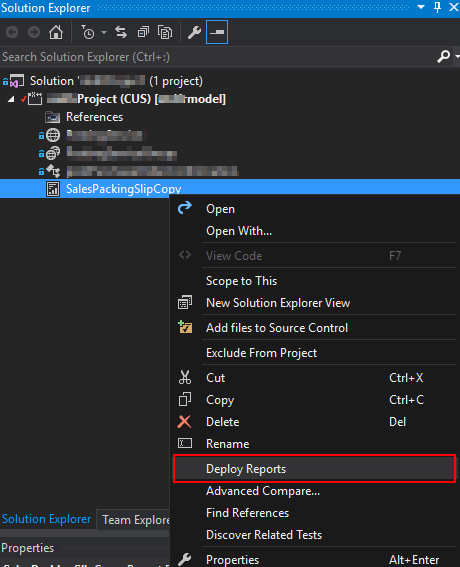upvote for B and C
Questions for the MB-500 were updated on : Jan 02 ,2026
You are developing a model extension for Dynamics 365 Finance that extends objects from the Application Foundation package.
You need to create and configure a new model for the extension.
Which two actions should you perform? Each correct answer presents part of the solution.
NOTE: Each correct selection is worth one point.
ad
A: You must create a class.
D: Extension lets you extend existing artifacts in a new model.
A model that contains only extension customizations can be compiled into its own assembly and be deployed in its own package.
Reference:
https://docs.microsoft.com/en-us/dynamics365/fin-ops-core/dev-itpro/extensibility/class-extensions https://docs.microsoft.com/en-us/dynamics365/fin-ops-core/dev-itpro/dev-tools/model-split
You are developing a model extension for Dynamics 365 Finance.
You must create a model extension that extends objects from the Application suite package.
You need to create and configure a new model for the extension.
Which two actions should you perform? Each correct answer presents part of the solution.
NOTE: Each correct selection is worth one point.
bc
upvote for B and C
A company is implementing Dynamics 365 finance and operations apps.
You are using the Acceptance test library (ATL) to test code in Visual Studio.
You need to create an entity test class to expose the entity properties.
Which method should you use?
a
The properties of the entity can be set or retrieved by using parm (property) methods
You are a Dynamics 365 Finance developer. You are testing a workflow in a user acceptance testing environment.
You need to ensure that a specific user can accept purchase requisitions only if the requisition is in a specific status.
Which two options can you configure to achieve the goal? Each correct answer presents a complete solution.
NOTE: Each correct selection is worth one point.
bc
B: The approval step that you're configuring might be required only if specific conditions are met.
C: A conditional decision is a point at which a workflow divides into two branches. The system determines which branch is used by evaluating the submitted document to determine whether it meets specific conditions.
Reference:
https://docs.microsoft.com/en-sg/dynamics365/fin-ops-core/fin-ops/organization-administration/configure-conditional-decision-workflow
DRAG DROP
A company uses Dynamics 365 Finance.
The company needs to track deletions of purchase order header records only.
You need to enable the change tracking.
Which four actions should you perform in sequence? To answer, move the appropriate actions from the list of actions to the answer area and arrange them in the correct order.


DRAG DROP
You create a Power Apps app to display customer feedback.
You need to submit and display customer feedback for each sales order.
In which order should you perform the actions? To answer, move all actions from the list of actions to the answer area and arrange them in the correct order.


Note: This question is part of a series of questions that present the same scenario. Each question in the series contains a unique solution that might meet the stated goals. Some question sets might have more than one correct solution, while others might not have a correct solution.
After you answer a question in this section, you will NOT be able to return to it. As a result, these questions will not appear in the review screen.
You are developing a form for Dynamics 365 Finance.
You need to add a button that allows users to run a report.
Solution: Create an output menu item. Add the output menu item to the form button and then link the report to the output menu item.
Does the solution meet the goal?
b
Instead create an action menu item.
Reference:
https://docs.microsoft.com/en-us/dynamics365/fin-ops-core/dev-itpro/user-interface/action-controls
You are a Dynamics 365 Finance developer.
You need to deploy a new report in a development environment.
From which two locations can you deploy the report? Each correct answer presents a complete solution.
NOTE: Each correct selection is worth one point.
ad
A: An AOT package is a deployment and compilation unit of one or more models that can be applied to an environment. It includes model metadata, binaries, reports and other associated resources.
D:
Reference:
https://docs.microsoft.com/en-us/dynamics365/fin-ops-core/dev-itpro/deployment/create-apply-deployable-package
You need to configure filtering for the Vendor Past Due Invoices form.
Which two filtering types can you use? Each correct answer presents a complete solution.
NOTE: Each correct selection is worth one point.
ac
A: QuickFilter: A framework-provided filtering mechanism that can appear above any list or grid, and that provides fast single-column filtering.
C: Grid column filtering: The user can define filter conditions and perform single-column sorting by using a drop dialog that is opened from the grid column header.
Scenario: You must create a batch job that runs on the last day of each month to update the current unpaid invoices with changes in the minimum invoice amount.
The job must meet the following requirements:
Allow users to specify vendors to include in the job.
Accept the following parameters: Vendor, DueDate.
Be callable by an Action menu item.
Use SysOperation Framework for all batch jobs.
Reference:
https://docs.microsoft.com/en-us/dynamics365/fin-ops-core/dev-itpro/user-interface/filtering
You use the performance timer to monitor and optimize Dynamics 365 performance.
You need to view information about how many users are currently using the application.
Which performance counter should you use?
a
Reference:
https://docs.microsoft.com/en-us/dynamics365/fin-ops-core/dev-itpro/perf-test/performance-timer
A and D makes the cut out of them all
You need to create and configure a new model for the extension. A is not correct because this question refers to creating and configuring model. For me the correct are C. (create the extension model that refers to Application Foundation package) and B. (assign the layer)
A. Create an extension class that references the Application Foundation.
E. Create a new model that is part of an existing package.